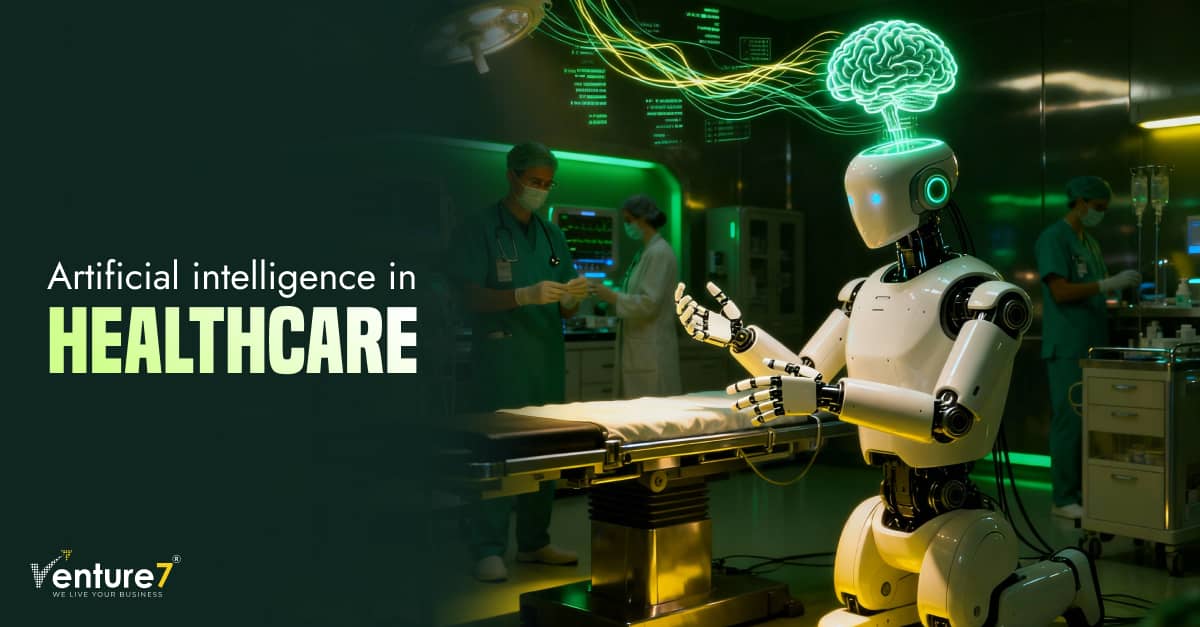Artificial Intelligence (AI) in healthcare is no longer a futuristic concept—it’s a transformative reality redefining how care is delivered, diseases are diagnosed, and patients are treated. From predictive analytics that forecast patient risks to AI-powered imaging that detects cancer earlier than the human eye, the potential of AI technology in medicine is limitless.
Let’s explore how artificial intelligence is revolutionizing the healthcare ecosystem.
What is Artificial Intelligence in Healthcare?
Artificial intelligence in healthcare refers to the use of advanced algorithms and machine learning models to analyze complex medical data and assist in clinical decision support. AI systems can mimic human cognition—learning from data patterns, reasoning through complex scenarios, and even self-correcting based on outcomes.
In simple terms, AI helps doctors, hospitals, and researchers process vast amounts of medical information quickly and accurately. AI healthcare solutions applications include diagnostic imaging analysis, predictive modeling, robotic surgeries, digital health assistants, and more.
By integrating AI into healthcare systems, organizations can automate repetitive tasks, identify treatment gaps, and deliver faster, evidence-based decisions that improve patient outcomes.
At Venture7®, we help healthcare organizations harness the power of AI to improve clinical workflows, reduce costs, and deliver personalized care.
Why AI in Healthcare Matters: Addressing Industry Challenges
Healthcare systems worldwide are under immense pressure—rising costs, physician burnout, and growing patient demands are straining traditional models. Artificial intelligence in healthcare offers a data-driven solution to these challenges.
Here’s why AI technology in medicine truly matters:
- Data-Driven Decision-Making: AI can analyze millions of patient records, genetic profiles, and clinical studies to help physicians make accurate, evidence-based decisions.
- Efficiency and Automation: Routine administrative tasks—such as billing, scheduling, and documentation—can be automated, allowing clinicians to focus more on patient care.
- Early Disease Detection: AI algorithms can detect diseases like cancer, diabetes, or heart conditions at early stages, significantly improving survival rates through proactive health data analysis.
- Personalized Treatment Plans: AI models analyze patient data to create tailored treatment plans based on genetics, lifestyle, and medical history.
- Operational Optimization: Hospitals use AI to predict patient inflow, optimize resource allocation, and minimize wait times, leading to greater healthcare operational efficiency.
In short, artificial intelligence bridges the gap between data overload and actionable insight—making healthcare smarter, faster, and more humane.
7 Key Benefits of AI in Healthcare
The benefits of AI extend across every aspect of healthcare operations, from patient diagnosis to hospital administration. Let’s explore some key advantages:
- Improved Diagnostics Accuracy & Medical Imaging Analysis AI-powered diagnostic tools can analyze X-rays, MRIs, and CT scans with incredible precision—often identifying abnormalities that even trained radiologists might miss, enhancing the speed of medical imaging analysis.
- Predictive Analytics for Patient Care AI algorithms can predict patient deterioration, readmission risks, or disease progression, enabling preventive care and timely intervention.
- Accelerated Drug Discovery and Development AI accelerates the drug discovery process by identifying potential compounds and predicting how they’ll interact with biological systems, reducing years of research into months.
- True Personalized Medicine AI combines genomic data, health records, and real-time monitoring to deliver treatments specifically designed for individual patients, moving toward truly personalized treatment plans.
- Administrative Efficiency Automation reduces manual paperwork, claim errors, and staffing inefficiencies, saving both time and money for the organization.
- Enhanced Patient Experience and AI Patient Monitoring Chatbots and virtual health assistants provide 24/7 support, medication reminders, and appointment scheduling—improving accessibility and satisfaction through continuous AI patient monitoring.
- Stronger Clinical Decision Support The core function of many AI healthcare solutions is providing physicians with synthesized, evidence-based data points instantly, empowering better decisions at the point of care.
How to Implement AI in Healthcare: A 6-Step Strategy
Implementing artificial intelligence (AI) in healthcare requires a strategic and step-by-step approach. Here’s how to get started:
Step 1: Identify High-Value Use Cases Begin by assessing where AI can add the most value—such as medical imaging analysis, clinical decision support, or workflow automation.
Step 2: Assess Data Readiness AI thrives on quality data. Ensure your organization’s health records, imaging data, and patient interactions are clean, structured, and compliant with HIPAA regulations.
Step 3: Choose the Right Technology Partner Collaborate with an experienced AI development company like Venture7®, which understands both healthcare operations and regulatory standards.
Step 4: Build and Test AI Models Develop machine learning models using historical healthcare data. Conduct rigorous testing to ensure clinical accuracy and ethical safety.
Step 5: Integration and Training Integrate AI tools into existing healthcare IT systems (like EHR or CRM). Train staff to use them effectively, addressing any resistance to change.
Step 6: Monitor and Optimize Continuously track performance, accuracy, and patient outcomes. AI systems improve over time with feedback and real-world data.
Challenges and Common Mistakes in AI Adoption
While AI offers transformative potential, several challenges and pitfalls can slow adoption:
- Data Privacy and Security: Healthcare data is sensitive. Failing to comply with HIPAA or GDPR can lead to legal and reputational damage.
- Lack of Quality Data: Incomplete or inconsistent data reduces AI accuracy and reliability.
- Integration Issues: Many hospitals use outdated IT systems that aren’t AI-ready.
- Ethical and Bias Concerns: AI models trained on biased data can lead to unfair or inaccurate outcomes.
- Resistance to Change: Healthcare professionals may hesitate to trust AI-driven insights without proper training or transparency.
Avoiding these mistakes requires a combination of strong data governance, clear communication, and a reliable AI technology partner.
Future Trends of Artificial Intelligence in Healthcare
The future of AI in healthcare is incredibly promising. Emerging trends include:
- AI-Driven Precision Medicine: Tailoring treatment based on a patient’s genetic and molecular profile.
- Generative AI for Clinical Documentation: Automating reports, summaries, and patient notes using natural language processing (NLP).
- AI-Powered Mental Health Tools: Emotion AI and behavioral analytics for diagnosing and managing mental health conditions.
- Remote Patient Monitoring (RPM): AI algorithms that analyze real-time wearable data for chronic disease management.
- Robotic Surgery: Surgical robots using AI to improve precision and minimize recovery times.
As technology evolves, AI will continue to play a pivotal role in reshaping how we prevent, diagnose, and treat diseases.
Why Choose Venture7® for AI Healthcare Solutions
At Venture7®, we specialize in designing and deploying AI-driven healthcare solutions that empower organizations to deliver better patient care and operational excellence.
Our expertise covers:
- AI-based patient engagement platforms
- Predictive analytics for hospital management
- AI-powered EHR automation and workflow optimization
- Machine learning solutions for diagnostics and medical imaging
With a proven track record across the U.S., Germany, and Singapore, Venture7® helps healthcare organizations implement scalable, secure, and compliant AI systems that transform data into clinical intelligence.
Ready to Transform Your Healthcare Operations with AI?
Contact Venture7® today to explore how our AI development services can help you automate workflows, improve patient outcomes, and lead the next generation of intelligent healthcare systems.





